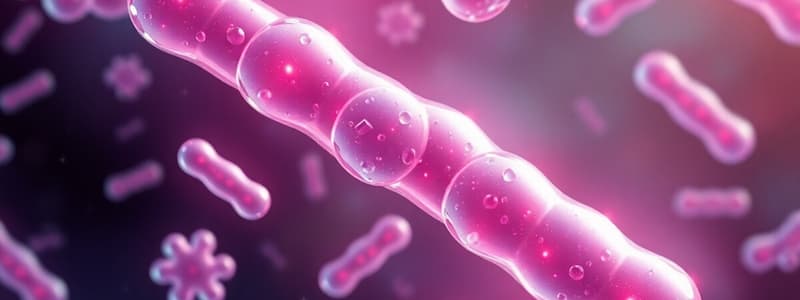Podcast
Questions and Answers
Which oral cephalosporin has the highest bioavailability?
Which oral cephalosporin has the highest bioavailability?
- Cefaclor (correct)
- Cefprozil (correct)
- Cefixime
- Cephalexin (correct)
What is the role of esterification in oral cephalosporins?
What is the role of esterification in oral cephalosporins?
- To improve parenteral administration
- To enhance renal excretion
- To increase lipid solubility and enhance absorption (correct)
- To decrease bioavailability
Which of the following cephalosporins is primarily parenteral?
Which of the following cephalosporins is primarily parenteral?
- Cefazolin (correct)
- Cefadroxil
- Cephalexin
- Cefaclor
How does food intake affect the bioavailability of certain cephalosporins?
How does food intake affect the bioavailability of certain cephalosporins?
What primarily influences the absorption of cephalosporins in the intestinal epithelium?
What primarily influences the absorption of cephalosporins in the intestinal epithelium?
Why might dose adjustment be necessary for cephalosporins?
Why might dose adjustment be necessary for cephalosporins?
Which of the following cephalosporins is considered a prodrug for better oral absorption?
Which of the following cephalosporins is considered a prodrug for better oral absorption?
Which cephalosporin is known for its long half-life and high protein binding, making it suitable for treating gonorrhea and meningitis?
Which cephalosporin is known for its long half-life and high protein binding, making it suitable for treating gonorrhea and meningitis?
Which generation of cephalosporins includes cefazolin?
Which generation of cephalosporins includes cefazolin?
What is the main route of administration for Cefprozil?
What is the main route of administration for Cefprozil?
Which cephalosporin has a short half-life of less than 1 hour and is excreted unchanged by the kidneys?
Which cephalosporin has a short half-life of less than 1 hour and is excreted unchanged by the kidneys?
What is the recommended action for dosing with Ceftazidime in patients with renal dysfunction?
What is the recommended action for dosing with Ceftazidime in patients with renal dysfunction?
What percentage of oral bioavailability does Cefixime have regardless of food?
What percentage of oral bioavailability does Cefixime have regardless of food?
Which of the following cephalosporins is metabolized in vivo to a less active metabolite?
Which of the following cephalosporins is metabolized in vivo to a less active metabolite?
Which cephalosporin is most suitable for parenteral administration due to its potency against certain bacterial infections?
Which cephalosporin is most suitable for parenteral administration due to its potency against certain bacterial infections?
What is the primary factor that limits the antimicrobial activity and elimination of ceftriaxone?
What is the primary factor that limits the antimicrobial activity and elimination of ceftriaxone?
How do hypoalbuminaemia conditions affect the pharmacokinetics of ceftriaxone?
How do hypoalbuminaemia conditions affect the pharmacokinetics of ceftriaxone?
What is a desirable characteristic of the free drug concentration in relation to the minimal inhibitory concentration (MIC) for optimal treatment outcomes?
What is a desirable characteristic of the free drug concentration in relation to the minimal inhibitory concentration (MIC) for optimal treatment outcomes?
Why should ceftriaxone be avoided in neonates with hyperbilirubinemia?
Why should ceftriaxone be avoided in neonates with hyperbilirubinemia?
Which cephalosporin has an oral bioavailability 40 – 50% regardless of food and is suitable for outpatient use?
Which cephalosporin has an oral bioavailability 40 – 50% regardless of food and is suitable for outpatient use?
What structural feature defines carbapenems?
What structural feature defines carbapenems?
Which of the following is NOT a characteristic of carbapenems?
Which of the following is NOT a characteristic of carbapenems?
Which condition can result from high levels of free bilirubin due to ceftriaxone administration in neonates?
Which condition can result from high levels of free bilirubin due to ceftriaxone administration in neonates?
Which of the following antibiotics is NOT one of the four FDA-approved carbapenems?
Which of the following antibiotics is NOT one of the four FDA-approved carbapenems?
What is the primary reason for administering carbapenems via IV infusion?
What is the primary reason for administering carbapenems via IV infusion?
What effect does cilastatin have when coadministered with imipenem?
What effect does cilastatin have when coadministered with imipenem?
Which of the following statements about meropenem and ertapenem is true?
Which of the following statements about meropenem and ertapenem is true?
Why may patients with renal impairment require adjusted dosages of carbapenems?
Why may patients with renal impairment require adjusted dosages of carbapenems?
What is a characteristic feature of ertapenem compared to other carbapenems?
What is a characteristic feature of ertapenem compared to other carbapenems?
How is imipenem metabolized in the human body?
How is imipenem metabolized in the human body?
What percentage of meropenem's dose is excreted unchanged in urine over 12 hours?
What percentage of meropenem's dose is excreted unchanged in urine over 12 hours?
What is the impact of combining imipenem-cilastatin with relebactam?
What is the impact of combining imipenem-cilastatin with relebactam?
Flashcards are hidden until you start studying
Study Notes
Cephalosporins
- Cephalosporins are a class of beta-lactam antibiotics (share core structure with penicillins)
- Cefaclor, Cefadroxil, Cefprozil, Cephalexin, Ceftibuten are acid-stable oral cephalosporins with high bioavailability (80% to 95%)
- Cefixime has lower bioavailability (40% to 50%)
- Most oral cephalosporins are absorbed from the intestinal mucosa by passive diffusion, enhancing absorption if the drug is lipophilic
- Some oral cephalosporins are esterified (e.g., Cefuroxime axetil) to increase lipid solubility and enhance absorption
- Prodrugs are hydrolyzed after intestinal absorption by esterases in the intestinal epithelium to their active metabolites
- The bioavailability of Cefuroxime axetil is relatively low (25% to 50%) but is enhanced by concomitant food intake
1st Generation Cephalosporins
- Cephalexin: Oral
- Cephradine: Oral and parenteral
- Cefadroxil: Oral (long acting)
- Cefazolin: Parenteral (IV, IM)
- Cefazolin has high plasma protein binding (85%)
- Cefazolin is mainly renally excreted unmetabolized by glomerular filtration in urine
- Dose adjustments (reduction) are necessary for patients with renal impairment
2nd Generation Cephalosporins
- Cefuroxime:
- Parenteral (IV) as Cefuroxime sodium (poor oral bioavailability)
- Oral (suspension, tablets) as Cefuroxime axetil (prodrug, more lipophilic, better oral absorption)
- Can be orally combined with clavulanic acid
- Crosses the blood-brain barrier
- Cefaclor:
- Oral
- More lipophilic (due to Cl) for better oral absorption
- Cefprozil:
- Oral
- Long acting
- Cefoxitin:
- IV
- Short half-life (<1h)
- Excreted unchanged by the kidney
- Cefoxitlin:
- IV
- Excreted unchanged by the kidney
3rd Generation Cephalosporins
- Ceftriaxone:
- Parenteral (IV, IM)
- Long acting
- High protein binding
- Crystallization with Ca
- Used for gonorrhea and meningitis
- Cefotaxime:
- Parenteral (IV, IM)
- Short half-life (1h)
- Good distribution in the CNS (used for meningitis)
- Metabolized into less active metabolites
- Ceftazidime:
- Parenteral (IV, IM)
- Short half-life (1.5h)
- Excreted unchanged renally, dose adjustment needed with renal dysfunction
- Cefixime:
- Oral suspension, tablets, and capsules
- Oral bioavailability 40-50% (regardless of food)
- Moderate half-life (3-4h)
- Excreted unchanged renally, dose adjustment needed with renal dysfunction
ADME (Absorption, Distribution, Metabolism, Excretion) of Cephalosporins
- Absorption: Varied based on specific cephalosporin; some are orally absorbed, some require parenteral administration
- Distribution: Widely distributed in the body
- Metabolism:
- Ceftriaxone: Unmetabolized
- Cefotaxime: Metabolized into less active metabolite (desacetyl-cefotaxime)
- Excretion: Mainly through glomerular filtration in urine
- Renal impairment: Requires dose adjustment to prevent accumulation
Ceftriaxone and Protein Binding
- Ceftriaxone undergoes extensive binding to plasma proteins (albumin) which contributes to its long half-life
- Antimicrobial activity and elimination are limited to the unbound fraction of the drug
- The free/unbound drug concentration should exceed the minimum inhibitory concentration (MIC) at steady state
- Patients with hypoalbuminemia (low albumin level in blood) will affect the pharmacokinetics of ceftriaxone (reduced protein binding, higher free drug level, shorter half-life, higher volume of distribution)
Safety Criteria for Ceftriaxone Administration to Neonates
- Hyperbilirubinemia (high bilirubin blood level) is common in neonates
- Ceftriaxone should be avoided in neonates with hyperbilirubinemia due to the potential risk of displacing bilirubin from albumin, increasing the risk of bilirubin encephalopathy
- Ceftriaxone competes with bilirubin for binding to human serum albumin (competitive binding)
- Ceftriaxone displaces bilirubin from albumin-binding sites, increasing free bilirubin concentrations in the blood
- High bilirubin levels in the blood can deposit in the brain tissue, causing irreversible damage (bilirubin encephalopathy)
Ceftriaxone and Calcium
- Ceftriaxone can form a precipitate with calcium in the body, leading to potential complications
- Biliary pseudolithiasis (false stones in the bile duct) may occur
Carbapenems
- Carbapenems are beta-lactam antibiotics with a five-membered ring fused to a beta-lactam ring
- Carbapenems are highly resistant to various beta-lactamases
- Carbapenems are among the broadest-spectrum antimicrobials available
- Administered via IV infusion due to poor oral absorption
- Widely distributed in the body
- Mainly excreted by the kidneys
- Dose adjustment for patients with reduced renal function is crucial to prevent drug accumulation
- Imipenem, Meropenem, Ertapenem, and Doripenem are FDA-approved carbapenems
Imipenem Formulations
- Imipenem is rapidly metabolized (deactivated) by the human kidney enzyme dehydropeptidase-1 (DHP-1) in the renal brush border
- Cilastatin is a DHP-1 inhibitor, co-administered with imipenem:
- Increases imipenem's in vivo half-life
- Enhances tissue penetration
- Prevents nephrotoxicity (kidney damage) associated with imipenem when administered alone
- Imipenem-cilastatin combined with relebactam extends the spectrum of activity against carbapenemase-producing bacteria (including multi-drug resistant Gram-negative bacteria)
Meropenem and Ertapenem
- Meropenem and ertapenem are more stable towards the DHP-1 system and can be administered without cilastatin
- Ertapenem has a longer half-life than meropenem, allowing for once-daily IV infusion dosing
- Meropenem:
- 70% of the dose is excreted unchanged in urine over 12 hours
- Ertapenem:
- 80% is recovered in urine (nearly half intact and the other half as a ring-opened metabolite)
Studying That Suits You
Use AI to generate personalized quizzes and flashcards to suit your learning preferences.





